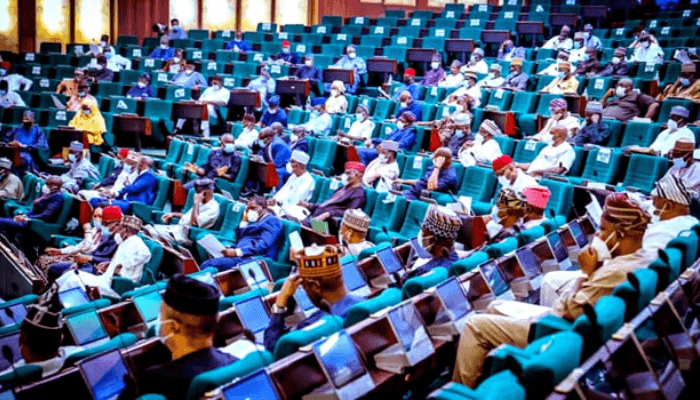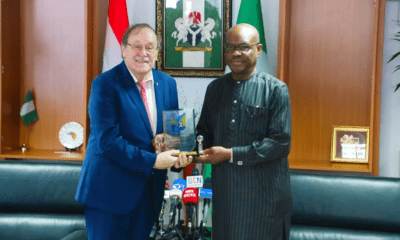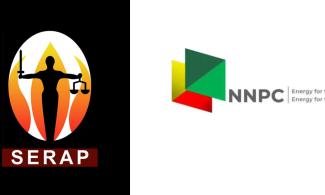News
Account for trillions of FAAC allocations or face legal action — SERAP tells 36 governors, Wike

…As FG, States, LGs share N1.1trn in March
The Socio-Economic Rights and Accountability Project (SERAP) has urged Nigeria’s 36 state governors and the Minister of the Federal Capital Territory, Abuja, Mr Nyesom Wike to “provide our organization with documents on the spending of trillions of FAAC allocations received by your state and the FCT since 1999, and to widely publish any such documents.”
SERAP also urged them “to invite Independent Corrupt Practices and Other Related Offences Commission (ICPC) and Economic and Financial Crimes Commission (EFCC) to jointly track and monitor the spending of FAAC allocations by your state and the FCT and to probe any allegations of corruption linked the allocations.”
SERAP’s requests followed reports that the Federation Account Allocation Committee (FAAC) disbursed N1.123 trillion to the federal, state, and local governments for March 2024 alone. States collected N398.689 billion.
In the Freedom of Information (FoI) requests dated 20 April 2024 and signed by SERAP deputy director Kolawole Oluwadare, the organisation said: “Nigerians ought to know in what manner public funds including FAAC allocations, are spent.”
SERAP said, “Without this information, Nigerians cannot follow the actions of their states and the FCT and they cannot properly fulfill their responsibilities as citizens.”
According to SERAP, “trillions of FAAC allocations received by Nigeria’s 36 states and the FCT have allegedly gone down the drain. The resulting human costs directly threaten the human rights of socially and economically vulnerable Nigerians.”
The FoI requests, read in part: “ensuring that the FAAC allocations received by your state and the FCT are spent to achieve the security and welfare of Nigerians are serious and legitimate public interests.”
“Secrecy in the spending of FAAC allocations received by your state and the FCT is entirely inconsistent and incompatible with the Nigerian Constitution 1999 [as amended] and the country’s international anti-corruption obligations.
“Secrecy in the spending of FAAC allocations received by your state and the FCT also denies Nigerians the right to know how public funds are spent. Transparency in the spending would allow them to retain control over their government.
“The documents should include the evidence and list of specific projects completed with the FAAC allocations collected, the locations of any such projects and completion reports of the projects.
“The documents should also include details of the salaries and pensions paid from the FAAC allocations collected, as well as the details of projects executed on hospitals and schools with the FAAC allocations.
“Despite the increased FAAC allocations to states and FCT, millions of residents in your state and the FCT continue to face extreme poverty and lack access to basic public goods and services.
“The reported removal of petrol subsidy and the floating of the exchange rate by the Federal Government has translated into increased FAAC allocations to states and the FCT. However, there is no corresponding improvement in the security and welfare of millions of Nigerians.
“FAAC allocations received by your state and the FCT are reportedly characterised by mismanagement, diversion of funds, and abandoned projects. FAAC allocations have also been allegedly spent for other purposes such as election campaigns and political patronage.
“Publishing the documents on the spending of FAAC allocations by your state and the FCT would promote transparency, accountability, and reduce the risks of corruption in the spending of the funds.
“Publishing the documents would enable Nigerians to meaningfully engage in the implementation of projects executed with the FAAC allocations collected.
“The report that some 140 million Nigerians are poor suggests corruption and mismanagement in the spending of trillions of naira in FAAC allocations collected by your state and the FCT.
“We would be grateful if the recommended measures are taken within 7 days of the receipt and/or publication of this letter. If we have not heard from you by then, SERAP shall consider appropriate legal actions to compel you and your state and the FCT to comply with our requests in the public interest.
“According to our information, the Federation Account Allocation Committee (FAAC) last week disbursed N1.123 trillion to the federal, state and local governments for March 2024.
“State governments got N398.689 billion while local government councils got N288.688 billion. The mineral-producing states received an additional N90.124 billion (13% of mineral revenue). In February, states collected N336 billion.
“According to the Nigeria Extractive Industries Transparency Initiative (NEITI), the federal, states and local governments shared N10.143 trillion from the Federation Account as statutory revenue allocations in 2023, with states collecting N3.585 trillion.
“SERAP also urges you to provide details of the transparency and accountability mechanisms that have been put in place to ensure that the trillions of naira of FAAC allocations that have been received by your state and the FCT are not embezzled, misappropriated or diverted into private pockets.
“SERAP is concerned about the persistent lack of transparency and accountability in the spending of FAAC allocations by your state and the FCT.
“SERAP notes that Section 15(5) of the Nigerian Constitution requires public institutions to abolish all corrupt practices and abuse of power.
“Section 16(2) of the Nigerian Constitution further provides that, ‘the material resources of the nation are harnessed and distributed as best as possible to serve the common good.’
“Section 13 of the Nigerian Constitution imposes clear responsibility on your state to conform to, observe and apply the provisions of Chapter 2 of the constitution.
“Nigeria has made legally binding commitments under the UN Convention against Corruption to ensure accountability in the management of public resources.
“Nigerians are entitled to the right to receive information without any interference or distortion, and the enjoyment of this right should be based on the principle of maximum disclosure, and a presumption that all information is accessible subject only to a narrow system of exceptions.
“The Freedom of Information Act, Section 39 of the Nigerian Constitution, article 9 of the African Charter on Human and Peoples’ Rights and article 19 of the International Covenant on Civil and Political Rights guarantee to everyone the right to information, including the documents on the spending of FAAC allocations by your state.
“The Nigerian Constitution, Freedom of Information Act, and the country’s anti-corruption and human rights obligations rest on the principle that citizens should have access to information regarding their public institutions’ activities.”
Meanwhile, the Federation Account Allocation Committee (FAAC), at its April 2024 meeting chaired by the Accountant General of the Federation, Mrs. Oluwatoyin S. Madein, shared a total sum of N1,123.391 trillion to the three tiers of government as Federation Allocation for the month of March, 2024 from a gross total of N1,867.808 trillion.
From the stated amount inclusive of Gross Statutory Revenue, Value Added Tax (VAT), Electronic Money Transfer Levy (EMTL), and Exchange Difference (ED), the Federal Government received N345.890 Billion, the States received N398.689 Billion, the Local Government Councils got N288.688 Billion, while the Oil Producing States received N90.124 Billion as Derivation, (13% of Mineral Revenue).
The sum of N69.537 Billion was given for the cost of collection, while N674.880 Billion was allocated for Transfers Intervention and Refunds.
The Communique issued by the Federation Account Allocation Committee (FAAC) at the end of the meeting indicated that the Gross Revenue available from the Value Added Tax (VAT) for March 2024, was N549.698 Billion, which was an increase from the N460.488 Billion distributed in the preceding month, resulting in an increase of N89.210 Billion.
From that amount, the sum of N21.988 Billion was allocated for the cost of collection and the sum of N15.831 Billion given for transfers, intervention and refunds.
The remaining sum of N511.879 Billion was distributed to the three tiers of government, of which the Federal Government got N76.782 Billion, the States received N255.940 Billion, Local Government Councils got N179.158 Billion.
Accordingly, the Gross Statutory Revenue of N1,017.216 Trillion received in the month was lower than the sum of N1,192.428 Trillion received in the previous month of February 2024 by N175.212 Billion.
From that amount, the sum of N46.934 Billion was allocated for the cost of collection and a total sum of N659.049 billion for Transfers, Intervention and Refunds.
The remaining balance of N311.233 Billion was distributed as follows to the three tiers of government: Federal Government got the sum of N133.960 Billion, States received N67.946 Billion, the sum of N52.384 Billion was allocated to LGCs and N56.943 was given to Derivation Revenue (13% Mineral producing States).
Also, the sum of N15.369 Billion from Electronic Money Transfer Levy (EMTL) was distributed to the three (3) tiers of government as follows: the Federal Government received N2.213 Billion, States got N7.377 Billion, Local Government Councils received N5.164 Billion, while N0.615 Billion was allocated for Cost of Collection.
The Communique also disclosed N285.525 Billion from Exchange Difference, which was shared as follows: Federal Government received N132.935 Billion, States got N67.426 Billion, the sum of N51.983 Billion was allocated to Local Government Councils, while N33.181 Billion was given for Derivation (13% of Mineral Revenue) Value Added Tax (VAT), Import Duty, Gas Royalty, Companies Income Tax (CIT) and others increased considerably while Excise Duty, Oil Royalty, Petroleum Profit Tax (PPT), Customs External Tariff levies (CET) and Electronic Money Transfer Lev (EMTL) recorded decreases.
According to the Communique, the total revenue distributable for the current month of March 2024, was drawn from Statutory Revenue of N311.233 Billion, Value Added Tax (VAT) of N511.879 Billion, N14.754 Billion from Electronic Money Transfer Levy (EMTL), and N285.525 Billion from Exchange Difference, bringing the total distributable amount for the month to N1,123.391 trillion.
The balance in the Excess Crude Account (ECA) as at April 2024 stands at $473,754.57.
News
Tinubu targets increased gas production, unveils plants in Delta, Imo


President Bola Tinubu will commission three critical gas infrastructure projects undertaken by the Nigerian National Petroleum Company Limited and its partners.
They are the AHL Gas Processing Plant 2 in Delta State, the ANOH Gas Processing Plant, and the ANOH-OB3 CTMS Gas Pipeline Projects in Imo State. The gas projects have a combined estimated output of 1,400 million standard cubic feet per day.
Special Adviser to the President on Media and Publicity, Ajuri Ngelale, disclosed this in a statement he signed Friday titled ‘President Tinubu to commission critical gas infrastructure projects.’
“The projects support the federal government’s effort to grow value from the nation’s gas assets while eliminating gas flaring…and deepen domestic gas supply as a critical enabler for economic prosperity,” said Ngelale.
The AHL Gas Processing Plant 2 is an expansion to the Kwale Gas Processing Plant, which currently supplies about 130MMscf/d of gas to the domestic market.
The processing plant is designed to process 200MMscf/d of rich gas and deliver lean gas through the OB3 Gas Pipeline. However, the facility already injecting gas is scheduled to ramp up to 180mmscfd by the end of May.
Ngelale said this additional gas supply will “support further rapid industrialisation of Nigeria” and also “produce about 160,000 MTPA of Propane and 100,000 MTPA of Butane, which will reduce the dependency on LPG Imports.”
The AHL Gas Plant is being developed by AHL Limited, an incorporated Joint Venture owned by NNPC Limited and SEEPCO.
Meanwhile, the ANOH gas plant is an integrated 300MMscf/d capacity gas processing plant designed to process non-associated gas from the Assa North-Ohaji South field in Imo State.
The plant will produce dry gas, condensate, and LPG. The gas from the ANOH plant will significantly increase the domestic gas supply, leading to increased power generation and accelerated industrialisation.
The ANOH Gas Plant is being developed by ANOH Gas Processing Company, an incorporated Joint Venture owned by NNPC Limited and Seplat Energy Plc on a 50-50 basis.
With the facility mechanically completed in December 2023, the NNPC says it is finalising pre-commissioning activities.
Third is the ANOH-OB3 CTMS Gas Pipeline Project, which the Presidency said involves the engineering, procurement, and construction of 36”x23.3km ANOH-OB3 Project.
“The Transmission Gas Pipeline will evacuate dry gas from the Assa North-Ohaji South primary treatment facility to the OB3 Custody Transfer Metering Station for delivery into the OB3 pipeline system,” read the statement.
About 600MMscf/d is estimated to be available from two separate 2 x 300MMscf/d capacity gas processing production trains from AGPC & SPDC JV.
The 23.3km Anoh-OB3 PPL is scheduled for mechanical completion by May 15, 2024.
When commissioned, the projects will increase gas supply to the domestic market by approximately 500mmscf/d, creating a better investment climate and promoting balanced economic growth cumulatively, the Presidential Spokesman affirmed
News
House of Reps to review laws, practices restricting press freedom


The House of Representatives said on Friday that it would review the laws and practices restricting press freedom and the ability of the media to carry out its constitutional role in the country.
Rep. Akin Rotimi, Chairman, House Committee on Media and Public Affairs, said this while delivering a keynote address, to mark the 2024 World Press Freedom Day organised by the Konrad Adenauer Stiftung, Nigeria.
Rotimi said the legislature would prepare the ground for journalists to operate without any hindrance provided they adhere to the tenets of their profession.
“We will enhance good governance practices, transparency and
accountability through media chats, public hearings, town hall meetings, etc., amongst other scheduled legislative actions in Agenda 6,” he said.
The International Press Freedom Day, celebrated every May 3, is a day of reflection among media professionals and stakeholders on issues of press freedom and professional ethics.
Rotimi said that the 10th House of Representatives led by Speaker Tajudeen Abbas, had resolved to work with the media to ensure a successful running of the present government.
He said that the 1999 Constitution of the Federal Republic of Nigeria (as amended) conferred on the press a critical role as contained in Section 22 regarding obligations of the mass media.
“The role states that the press, radio, television and other agencies of the mass media shall at all times be free to uphold the fundamental objectives in this chapter and uphold the responsibility and accountability of the government to the people.
“Amongst many other challenges in the course of the discharge of this constitutional mandate, the press faces a disproportionate exposure to harm in the face of the widespread insecurity challenges in the country.
“There are also issues around the dearth of funding but I call on all stakeholders to continue with concerted efforts to address these challenges.
“There is no gainsaying that there are many miles to cover as far as media freedoms in our country is concerned but we have greatly improved from the days of military intervention in our polity (particularly, 1983 – 1998),” Rotimi added.
He urged the media to encourage introspection and self-regulation, and also look at the self-defeating ways that the press delegitimises their own struggle by not upholding ethics, and address them.
Mr Lukas Laible, Deputy Resident Representative, Konrad Adenauer Stiftung, Nigeria, said the press had become the enabler of Nigerian democracy.
“May 3 of every year is an important day for journalists as freedom of speech is the beacon of the practice.
“Without freedom of speech there won’t be freedom of press, and without freedom of the press, no society can be free.
“Journalists don’t just cover events, they are the people’s transmitter and they show capability in handling issues. They hold political leaders accountable and that is what makes democracy viable.
“Holding political leaders accountable enhances good governance. If the press fails to hold the government accountable, it will deviate from the people,” Laible said.
According to him, the press is so much trusted by the people and as such must make the people know the value of a free world.
Mrs Franca Aiyetan, Secretary, Nigerian Broadcasting Commission (NBC), who spoke during a panel session, urged journalists to always do their job in a way that would not consume the people.
Aiyetan, while speaking on the theme “Navigating the Intersection of Media Regulations, Press Freedom Advocacy and Ethical Journalism in the Face of Environmental Crises”, noted that NBC was established to have a formidable Nigerian media.
She said that NBC was not established as an attack dog for the government and as such would want the press to always work with it.
“If a detail about a truth will set two tribes against each other, then, there is something wrong with that truth.”
Another panelist, Mrs Mojirayo Ogunlana, the Executive Director, Digicivic Initiative, said journalists needed laws that should protect them while discharging their job.
“Threats to the lives of journalists should be declared as a state of emergency,” Ogunlana added.
She urged media practitioners to self-regulate themselves to prevent the government from exploiting any vacuum that could give it the opportunity to pounce on them.
News
Stop using repressive laws to intimidate journalists – SERAP, NGE tell FG


The Socio-Economic Rights and Accountability Project, SERAP, and Nigeria Guild of Editors, NGE, have called on Nigerian authorities at all levels of government to stop using repressive and anti-media laws to target, intimidate and harass journalists, critics and media houses.
The groups made the demand after an interactive session on ‘the state of press freedom in Nigeria’ held at the Radisson Blu Hotel in Ikeja.
In a joint statement, SERAP and NGE said that, “the government of President Bola Tinubu, the country’s 36 governors and FCT minister must now genuinely uphold press freedom, ensure access to information to all Nigerians, obey court judgments, and respect the rule of law”.
They expressed concerns about the escalating crackdown on the right to freedom of expression and media freedom and the flagrant disregard for the rule of law by authorities at all levels of government.
The groups note that the suppression of the press in recent times takes various forms ranging from extrajudicial to unlawful detentions, disappearances, malicious prosecutions and wrongful use of both legislation and law enforcement.
The statement read in part: “We would continue to speak truth to power and to hold authorities to account for their constitutional and international obligations including on freedom of expression and media freedom.
“Nigeria as a country has a long and unpleasant history of press gagging and clampdown on media freedom, which is evidence of extensive state censorship of media and in some cases, the utter control of state-owned media houses.
“This position has not changed considerably despite almost 25 years of unbroken democratic rule in the Fourth Republic.”
-
capital market2 years ago
Rt.briscoe, FBNH, Others halts negative performance of stock market
-
Finance3 months ago
Court orders Sen. Victor Umeh to repay N136m bank debt to AMCON
-



 Abuja Update2 months ago
Abuja Update2 months agoUNDP, FG partnership needed to achieve inclusion, equity- Minister
-
Abuja Update1 month ago
Banks drive stock market performance with N147bn gain
-



 Business2 weeks ago
Business2 weeks agoTingo Group unveils Tingo Electric, Tingo Cola drink at Lagos launch
-



 Health2 weeks ago
Health2 weeks agoCapacity training will reduce migration of health workers- NPHCDA
-
News4 months ago
Oil thieves sponsoring malicious media campaign against Navy – Spokesman
-



 Infotech1 month ago
Infotech1 month agoWorld Backup Day: NITDA urges Nigerians to ensure backup of data














